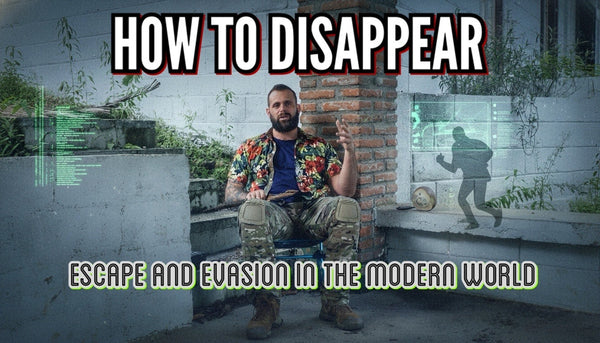How to Disappear | Modern Escape & Evasion
I’m Greg Tambone with Bone Tactical, former international fugitive and political prisoner. Today we’re talking about how to disappear the right way—legally, ethically, and effectively. This is not about evading justice. It’s about reclaiming your privacy, breaking toxic patterns, and protecting yourself from dangerous attention. Keep your head, keep your freedom, and keep your soul.
First, assess your situation. Who are you getting away from—and why? Is it an abusive ex, online harassment, a business rebrand, or you just need a hard reset? Rank the threat: capability, reach, motivation, resources, and timeline. If it’s criminal danger, consider involving an attorney and—where appropriate—law enforcement or a victims’ advocate group. If it’s reputational heat, you’re playing a different game. Hopefully you won’t have multiple governments and organized crime after you like I did but stay tuned for the full playbook either way. Step one is to identify the problem before you try to solve it.
Second, assess your resources and skills. Disappearing means transition, and transitions incur costs. Cash buys time. Skills buy options. Can you work with your hands? Build? Fix? Cook? Drive? Speak another language? The more value you can offer quietly and locally, the less you need to advertise yourself to survive. If money is tight, lean on skills. If skills are thin, learn fast.
Third, neutralize your digital footprint. Your phone, your browser, your apps… everything watches. Back up what you must keep, then prune. Close or anonymize social accounts. Delete old photos and posts. Change every important password. Turn on passkeys and hardware keys. Kill ad IDs and tracking toggles. Use privacy-respecting browsers and encrypted messengers for lawful communication. Ditch auto-login habits. If you wouldn’t say it in public, don’t type it online. If you don’t understand the world of digital tracking and counter-tracking you may have to give up “smart” electronic devices altogether. The alternative is your past coming knocking when you least expect it.
Fourth, control your physical footprint. Cameras are everywhere. That’s life. Your job isn’t to fight cameras; it’s to stop making patterns. If facial recognition tech is being used against you, you’ll have to change your face or keep it covered in public. Vary travel routes and timing. Stop announcing habits. Don’t leave identifying junk behind—mail with your name, packaging with your address, anything that ties you to a place. Keep your space clean and your movement quiet. If you have identifying habits, ticks, or tastes you’ll have to get past those as well…
Fifth, leave the right things behind. Sentimentality is expensive. If your situation allows, keep legal documents, professional licenses, essential records, and one clean set of contact details. Everything else can become a leash. If it screams “old you,” archive it or let it go. If whoever’s looking for you is powerful, determined, and dangerous… leave it all behind and burn the boat. The less you carry forward, the less you broadcast.
Sixth, build a quiet persona. Don’t “wear a disguise.” Become a new, simpler version of yourself. Cut or grow your hair to your new style. Shave or trim so facial-rec systems see a different shape—but keep it plausible. You have to build an entirely new identity as close to your former self as possible. The more common, the harder to single out. Move with calm confidence. Learn to smile without inviting conversation. Don’t make unnecessary eye contact but don’t stare at the floor. The modern gray man isn’t timid; he is whoever he wants to be.
Seventh, bring the minimum you’ll actually use. If you want to go far, you’ll need friends, and we’ll get to that. Right now, you’ll likely want to go fast, so go alone. Limit to one wardrobe that matches your new chosen identity. A sturdy, matching bag. Copies of critical documents stored securely, new if necessary. A small first-aid kit and a simple tool kit. Nothing flashy. Nothing “tactical-looking” if you’re trying to go unencumbered.
Eighth, craft a clean cover story that’s true enough to live with. You moved for work. You’re a philanthropist. Tired of the city. You’re studying. Keep it humble and boring. Memorize the backstory once; don’t improvise later. The bigger the lie, the harder the maintenance. The simpler the story, the safer the life.
Ninth, practice information discipline. Don’t announce plans. Don’t check in. Social media must be understood and used completely for disinformation, or don’t post at all. Keep separate email addresses for separate roles—legal, business, personal—and never cross streams. If someone pries, change the subject or keep it short. Curiosity is free; answers cost you.
Tenth, choose where you spend time. Large events, airports, stadiums, and political rallies concentrate cameras and attention. If you’re trying to cool off, pick low-signal environments. Shop at odd hours. Use smaller entrances and exits. Sit with your back to a wall and your face to the room. See problems early and step away before they grow. Plan everything before you do it. Run through possible scenarios, problems, and solutions mentally before you go.
Eleventh, rethink communications. If your voice is not be tracked, keep one primary number for legal and professional life. If you need separation for safety, use a second line with lawful, privacy-respecting settings and strong authentication. Turn off Bluetooth when not in use. Disable location sharing. Airplane mode is not off; off is not even off. When your phone’s got a battery in it, assume the world is listening—so speak accordingly. If you’re being heavily pursued you’ll need to learn how to effectively use and rotate burner phones if you want to use a phone at all.
Twelfth, used a tiered separation approach to safety. Pay in ways that don’t build marketing dossiers. Cash is still legal for now. Avoid stacking loyalty programs, coupons, and persistent identifiers that stitch your life together. Use a private mailbox or commercial mail receiving agency for packages once you’ve established your new identity. Keep your real residence off public labels.
Thirteenth, move like you belong. Until you’ve got your new identity squared away, you’ll need to be very careful with travel. Nothing in your name, nothing unusual, nothing illegal. Drive a reliable, common vehicle in good repair. Current tags, working lights, nothing that screams for a traffic stop. If you take transit, act like you’ve done it a thousand times. Look at schedules, not people. Headphones optional; awareness mandatory.
Fourteenth, build a new network slowly. You can’t do life alone, but you also can’t sprint into the wrong circle. Start with work, faith communities, service organizations, gyms, or classes where people bond around doing, not gossiping. Offer value. Show up on time. Pay your way. Let trust grow at the speed of trust.
Fifteenth, pick your destination with intention. Urban anonymity or rural quiet—both can work. You want low drama, low cost, and high predictability. If you move countries, do it lawfully. Visas, residencies, permits—handle your paperwork. Legal life is quieter life. Wherever you land, learn the local rhythms and respect them.
Let’s talk about mistakes that get people burned. Breaking routine to chase fun in high-signal places. Oversharing because loneliness bites. Letting anger write checks your freedom can’t cash. Reconnecting with the same crowd that caused the problem. Slipping back into old usernames, old numbers, old patterns. The little compromises add up. Don’t feed the trail.
Now about mindset. This only works if the inside changes with the outside. You’re not hiding; you’re simplifying. You’re not running; you’re choosing. Discipline over drama. Patience over pride. Calm over clever. You don’t need to “win” the internet. You need to go home safe at night.
If you do this for reputation management, build a new lane for your work. Fresh branding. Fresh value. Let your craft speak. If you do this for safety, talk to professionals who can help—lawyers, counselors, advocates. Document the threats, lock down your accounts, and make the paper trail your shield, not your weakness.
Here’s the core checklist burned into one sentence: Know your threat, fund your transition, erase patterns, control signals, travel ordinary, speak less, don’t draw negative attention, choose better people, go where the heat is low, and stay within the law.
You don’t need to vanish like a movie. You need to become peacefully uninteresting. That’s the modern art of disappearing: not darkness, but quiet. Not masks, but maturity. Not panic, but a plan.
Bone out.



